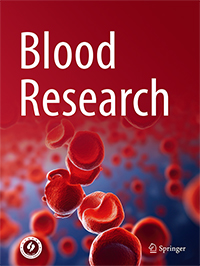Korean J Hematol 2002; 37(1):
Published online March 31, 2002
© The Korean Society of Hematology
급성골수성백혈병 환자의 관해유도 화학요법 후 과립구 집락촉진인자의 효과
최재혁, 이구, 오현아, 강희정, 이재련, 이경희, 현명수, 류헌모
영남대학교 의과대학 내과학교실,
대구가톨릭대학교 의과대학 내과학교실
The Effect of Granulocyte-Colony Stimulating Factor in Remission Induction Chemotherapy of Acute Myelogenous Leukemia
Background : Colony stimulating factors have been shown to accelerate recovery from severe neutropenia after intensive chemotherapy. To prove its clinical effectiveness, we conducted this study of administration of G-CSF in acute myelogenous leukemia after remission induction chemotherapy.
Methods :
Thirty six patients with acute myelogenous leukemia were assigned to one of two groups (21 to G-CSF treated group, 15 to control group) after remission induction chemotherapy administration. Treatment with G-CSF (lenograstim, 200 ㎍/㎡/d) was started 5 days after the end of chemotherapy and continued until the neutrophil count rose above 1,500/㎣.
Results : Treatment with G-CSF shortened neutropenic period after chemotherapy. The median time to recovery to neutrophil counts more than 500/㎣ from the end of chemotherapy was 19 days in G-CSF treated group and 25 days in control group. The incidence of infection was 19 cases in G-CSF treated group and 13 cases in control group and febrile periods were 12 days in G-CSF treated group and 15 days in control group, but there were no statistically significant differences. The duration of antibiotics treatment in G-CSF treated group was shorter than that of
control group. There was no evidence that G-CSF could increase remission duration and overall survival.
Conclusion : Recombinant G-CSF is safe and useful in patients after intensive chemotherapy, accelerating neutrophil recovery and thereby reducing the duration of antibiotics administration.
Keywords G-CSF; Neutropenia; Acute myelogenous leukemia;
Article
Korean J Hematol 2002; 37(1): 17-23
Published online March 31, 2002
Copyright © The Korean Society of Hematology.
급성골수성백혈병 환자의 관해유도 화학요법 후 과립구 집락촉진인자의 효과
최재혁, 이구, 오현아, 강희정, 이재련, 이경희, 현명수, 류헌모
영남대학교 의과대학 내과학교실,
대구가톨릭대학교 의과대학 내과학교실
The Effect of Granulocyte-Colony Stimulating Factor in Remission Induction Chemotherapy of Acute Myelogenous Leukemia
Jae Hyuk Choi, Gu Lee, Hyun Ah Oh, Hee Jung Kwang, Jae Lyun Lee, Kyung Hee Lee, Myung Soo Hyun, Hun Mo Ryu
Department of Internal Medicine, College of Medicine, Yeungnam University
Catholic University of Daegu, Daegu, Korea
Abstract
Background : Colony stimulating factors have been shown to accelerate recovery from severe neutropenia after intensive chemotherapy. To prove its clinical effectiveness, we conducted this study of administration of G-CSF in acute myelogenous leukemia after remission induction chemotherapy.
Methods :
Thirty six patients with acute myelogenous leukemia were assigned to one of two groups (21 to G-CSF treated group, 15 to control group) after remission induction chemotherapy administration. Treatment with G-CSF (lenograstim, 200 ㎍/㎡/d) was started 5 days after the end of chemotherapy and continued until the neutrophil count rose above 1,500/㎣.
Results : Treatment with G-CSF shortened neutropenic period after chemotherapy. The median time to recovery to neutrophil counts more than 500/㎣ from the end of chemotherapy was 19 days in G-CSF treated group and 25 days in control group. The incidence of infection was 19 cases in G-CSF treated group and 13 cases in control group and febrile periods were 12 days in G-CSF treated group and 15 days in control group, but there were no statistically significant differences. The duration of antibiotics treatment in G-CSF treated group was shorter than that of
control group. There was no evidence that G-CSF could increase remission duration and overall survival.
Conclusion : Recombinant G-CSF is safe and useful in patients after intensive chemotherapy, accelerating neutrophil recovery and thereby reducing the duration of antibiotics administration.
Keywords: G-CSF, Neutropenia, Acute myelogenous leukemia,





 PDF
PDF Standard view
Standard view Export citation
Export citation Share
Share  Previous Article
Previous Article



